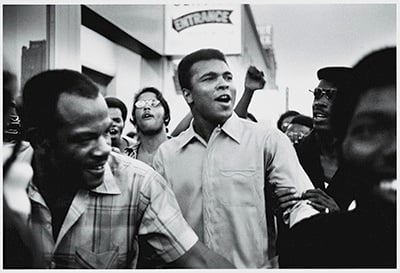Before online petitions and social media made it as easy as the click of a mouse,
to protest in America could mean facing professional, social, and financial ruin,
as well as a possible prison sentence.
Bill Siegel’s
The Trials of Muhammad Ali looks at a tumultuous period during the incomparable fighter’s life, when as an already
divisive figure, he stood his ground, affirmed his faith, and protested against what
he saw as an unjust war. But by seeking to cover the many different facets of Ali’s
life, the film often seems to zigzag over the highs and lows of his career without
finding its focus.
The images and the quotes from newsreel interviews with Ali in the ’60s and ’70s certainly
reinforce the narrative of a life spent struggling with issues of race and religion,
but the additional attempts to frame these events within a larger context come up
short. The opening scene from a British talk show reveals Ali listening to host
David Susskind refer to him as “a simplistic fool and a pawn,” while the fighter remains utterly
cool and expressionless. Nothing from the film’s present-day interviews can match
the composure Ali expresses in that single 30-second clip.
The movie explores Ali’s conversion to Islam, the changing of his name (from Cassius
Clay), and his bold decision to protest the Vietnam War and to face prison time rather
than enlist. The reaction it engenders is stark and undeniable, and Ali faces constant
pressure to defend and explain himself. In a brutal
Floyd Patterson fight, Patterson refuses to call him anything but Cassius Clay, so Ali strategically
pummels him for 12 rounds.
Siegel, who also directed 2002’s Oscar-nominated documentary
The Weather Underground, makes some occasionally suspect decisions with the subject matter, leaning heavily
on Ali’s Islamic faith while at times glossing over related controversies. In one
particular sequence, Ali’s friendship with
Malcolm X is highlighted, but the film speeds right through the debate over the Nation of Islam’s
alleged participation in Malcolm X’s assassination. Nation of Islam leader
Louis Farrakhan, in a present-day interview, denies any involvement by the organization, and the
film moves on and drops the issue entirely.
By the conclusion, when Ali’s indisputably thrilling journey—from prize fighter to
political lightning rod to recipient of the Presidential Medal of Freedom—has been
documented, it’s hard not to feel that
Trials has meandered through myriad clips for 90 minutes rather than focus on a particular
argument or vision.
When We Were Kings still stands as the best documentary about Ali the man, while the recent ESPN Films’
Muhammad and Larry is a powerful and thoroughly upsetting doc about Ali the fighter. Ali proclaimed
himself to be “the greatest,” and
Trials, while engaging at times, never quite rises to that standard.
Playing June 21, noon, at the National Portrait Gallery, and June 23, 2:45 PM, at
the Newseum.


















